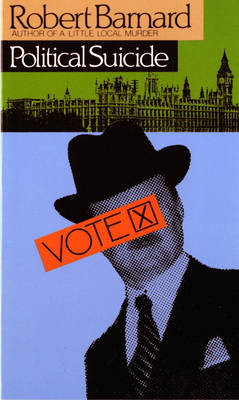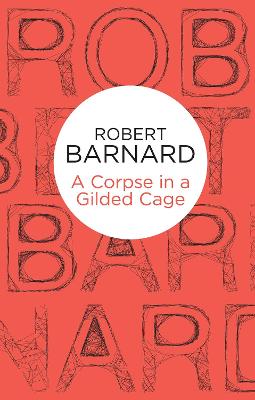Lythway Large Print Books
6 total works
Upstairs, in the room looking out to sea, the old man dictates wills, leaving things he no longer has to friends who are long dead. His children, who look after him, can cope with his senility, and thought there was nothing more to learn about his erratic life-style.
When Roderick Cotterel hears from his illegitimate half-sister he is intrigued, even charmed: she is the daughter of his father, the distinguished novelist Benedict Cotterel, by the famous actress Myra Mason. She is writing a book about her mother, and is looking for material. The affair between the two had been a gutter press sensation back in the 'sixties, but the embers have long since cooled. However, when Cordelia and her boyfriend arrive and begin research for the book both Roderick and his wife begin to have doubts. And when their peaceful Sussex village is threatened by a visit from an almost suspiciously friendly Myra Mason, they realize they have got into something from which it would require superhuman delicacy and tact to extricate themselves. In the event somebody solves their problems in a way that is neither tactful nor delicate, though it certainly is final.
'He never takes the easy path of repeating a winning formula.' Time Magazine
The Skeleton In The Grass, reminiscent of Robert Barnard's much-acclaimed Out of the Blackout, illuminates an earlier time and place: a small English village in 1936, as Franco's troops are conquering Spain and Hitler's legions are preparing to overrun Europe.
The world at large may be sliding into the abyss of disaster, but life at Hallam, country seat of the glamorous and renowned Hallam family, still represents the ultimate in British civilization. Teatime, with its cucumber sandwiches and cream cakes, continues as it has for a hundred years.
It's not that the Hallam family ignores the world outside its gracious doors. On the contrary, Helen and Dennis Hallam care passionately about peace and principle, and Dennis dramatically conveys these views to the nation in his controversial weekly review column.
Avowed pacifists, Helen and Dennis represent a political stance that the villagers mistrust and fear. That fear and suspicion turn to nasty pranks when a sinister Fascist major gains control over some of the local youths. Helen and Dennis, and their sons Oliver and Will, become the victims of cruel taunts and the kind of teasing that leads to terror.
As the Hallams and villagers grow more hostile, we see the story through the eyes of Sarah Causeley, and idealistic young woman who has recently come to be nursery governess at Hallam. To Sarah, the Hallams represent beauty, brilliance, and style-an idyllic life in the midst of chaos.
But as she watches, the Hallams' world begins to disintegrate, and a tense and unexpected encounter leads to a shocking murder.
Much more than a crime novel, The Skeleton in the Grass is an extraordinary piece of fiction that captures the essence of a family that captures the essence of a family and a world on the brink of extinction. With subtlety and skill, Robert Barnard amazes with his versatility and storytelling power.
Hexton-upon-Weir was ruled by its women: they set the tone, they made the decisions, they called the tune. When they decided to band together to block the appointment of a new vicar who was not only unacceptably High Church but - of all ugly things - celibate to boot, they managed to create merry hell. As the town was riven by faction and counter-faction, Helen Kitterage tried to remain aloof, but before long she was drawn into the maelstrom, as, during the down's fete, ill-will and conspiracy degenerated into murder. Helen was convinced that somewhere among the secrets of this murderous Cranford there must be found some key shame that someone had thought it worth killing to keep unknown.
In this tart and witty updating of the traditional English village mystery, 'the chameleon talent of Mr Barnard' (Sunday Times) is demonstrated once again through that sharp ear and eye that led the Washington Post to exclaim: 'One of the funniest men writing mysteries today has to be Robert Barnard.'
With the Nazis bombing London on a nightly basis, many working-class families sent their children to the comparative safety of the countryside. When the Blitz ended, the families came for their kids . . . but no one ever came for Simon Thorn. His name appears on no list of the evacuated children. And none of his meagre belongings offer any clues to his origins.
Now an adult, newly moved to London, Simon is puzzled by an odd sense of familiarity when he walks down certain streets. He remembers his years of terrible nightmares-nightmares that would cause him to wake up screaming, terrifying his bewildered foster parents. And he resolves, once and for all, to find out where he originally came from . . . even as everything he uncovers suggests that, really, he doesn't want to know.
Widely praised for his deliciously, maliciously witty mysteries, the multi-award-winning Robert Barnard takes a decidedly different tack in this fascinating novel of wartime London and the dark side of identity.
'An engrossing tale of a man's search for his identity and his discovery of an alarming past' Publishers Weekly
'There are shrewd characterisations and villains aplenty in this oddly affecting tale' Time
'Barnard untangles his riddle with great skill, and I suspect he is going to outwit all but a handful of readers' New York Times
Chetton Hall was one of the glories of Jacobean domestic architecture, and the Spenders had lived in Chetton ever since their founder had peculated the money to build it while he was the King’s Secretary of Monopolies. Over the years they had accumulated accrustations of dignity, to say nothing of wealth. Which made it doubly shocking when the Earldom descended to Percy Spender, who was ‘not quite’, not to mention his family, who were not at all. When the family descends on Chetton for his sixtieth birthday, accompanied by various hangers-on, their main obsession is to discover his intentions for the future of the place. Hardly less interested is his man of business, and his neighbours, who feel sadly the diminished glory of the house. The Spenders, in fact, have always felt like birds in a guilded cage at Chetton. Before the celebrations are over, one of the birds is a very dead duck indeed.
The traditional country house party murder is turned on its head, given a few twists, and ends up much reinvigorated in this witty and lively whodunit by a writer who, as described in The Times Literary Supplement, ‘can write most under the table with one hand behind his back.’
‘Mr Barnard always maintains an exceptionally high level, being as much littérateur as mystery story writer; fortunately, he never lets his literary flair get in the way of his mysteries.’ New York Times Book Review


